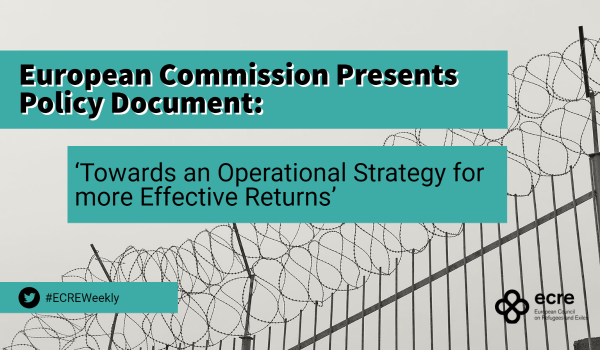On 24 January 2023, the European Commission presented a policy document, ‘Towards an operational strategy for more effective returns’, as well as an annex detailing specific actions points.
The policy document stresses the importance of an effective and common EU system for returns with key objectives to: “increase the number of effective returns overall, with a focus on returns to third countries where there are ‘no major political obstacles. As well as to “Implement returns more swiftly in order to support the integrity and credibility of Member States’ asylum systems and deter irregular border crossings” and “Ensure returns are sustainable and in line with European values and fundamental rights”.
This strategic focus will apply to all of the EU’s work on return with a ‘Team Europe’ approach, but will guide the work of the Return Coordinator and the High-Level Network for Return in particular.
There are four operational, more practical goals: to streamline the return process to make it quicker and more effective; to increase voluntary returns (including as a share of total returns); to foster a collaborative and coherent approach; and to improve the statistical evidence base of return.
In working towards these goals there will be a focus on responding to immediate needs, efficiency and closing loopholes (such as linking asylum procedures and returns, and the transition from voluntary to forced return procedures). Promoting return counselling and reintegration is also highlighted as is digitalising return management. Concrete targets or ‘flagship workstreams’ are included for 2023 including developing situational awareness on the functioning of return systems, doubling the number of third countries covered by the Frontex Joint Reintegration Services and a Frontex digitalisation gap analysis.
Meanwhile, in an informal meeting of Justice and Home Affairs (JHA) Ministers on 26 January held under the Swedish Presidency of the EU, the morning session confirmed the focus on returns for the Presidency, looking more concretely at improving cooperation on returns with third countries.
In response to the meeting in Sweden, the Swedish Network of Refugee Support Groups (FARR) cautioned against a disproportionate focus on returns. “If the statistics of the entire asylum process are included, including appeals (which are granted in 33% of those cases), a fairer picture of reality emerges, namely that more than half of the asylum seekers were granted permission”, the organisation stated.
This means that many people seeking asylum have good reasons for doing so. The focus of Ministers should be on how to make the asylum procedure work for people seeking protection, rather than how to make deportations more effective.

